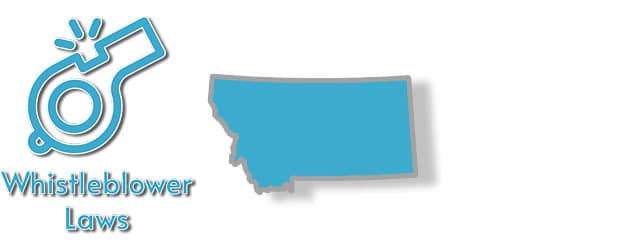
A Summary of Montana Whistleblower Laws
The state of Montana enacted the Wrongful Discharge From Employment Act to protect employees and also to replace the employment-at-will doctrine. Under this act, employees who have completed the probationary period of employment can only be discharged for ‘good cause’. Therefore, employees who are dismissed for other reasons can seek protection under this act. Also, the Montana legislature has passed a few statutory protections that protect employees under certain subject areas, e.g., discrimination.
This is a summary of Montana Whistleblower Laws, make sure to check out the Federal Whistleblower Laws as well.
Montana Whistleblower Laws
Statutory Protections for Whistleblowers in Montana
Wrongful Discharge From Employment Act
Under this act, a wrongful discharge is considered valid if the following is true:
- The discharge was in retaliation for the employee’s refusal to violate public policy or for disclosing a violation of public policy.
- The discharge was not for ‘good cause’, and the employee had completed the probationary period of employment.
- The employer violated the express provisions of its own written personnel policy.
If the employer does not have an established probationary period, the law dictates that a default probationary period of 6 months be put in place. Employees who have not completed the probationary period can be fired at will for any reason or no reason, unless the reason for the discharge violates the employer’s written personnel policy or if it was in retaliation for the employee’s refusal to violate public policy or for disclosing a violation of public policy. Mont. Code Ann. § 39-2-904.
Definitions
As used in this act, public policy means “a policy in effect at the time of discharge concerning the public health, safety, or welfare established by constitutional provision, statute, or administrative rule”. Good cause refers to “reasonable job-related grounds for dismissal based on a failure to satisfactorily perform job duties, disruption of the employer’s operation, or other legitimate business reason”.
This act does not apply to situations covered by other state or federal statutes that provide a procedure or remedy for resolving the dispute. Also, employees covered by a written collective bargaining agreement or a written contract of employment for a specific term are not covered under this act. Mont. Code Ann. § 39-2-912.
Discrimination
It is considered an unlawful discriminatory practice to discharge, expel or in any way discriminate against an individual in retaliation for:
- Opposing discriminatory practices forbidden by this statute.
- Filing a complaint under this statute.
- Testifying or participating in an investigation or proceeding under this statute.
Employee And Community Hazardous Chemical Information Act
Employers are not allowed to discharge, discipline, or in any way discriminate against an employee in retaliation for:
- Exercising a right endorsed by this act.
- Making a testimony under this act.
- Assisting others in exercising their rights or duties under this act.
Under this act, employees who may be exposed to hazardous chemicals must be informed by their employers of the potential and exposure to such chemicals. They must also be provided with the workplace chemical list and material safety data sheet for each hazardous chemical. Mont. Code Ann. § 50-78-204(4).
Whistleblower Hotline In Montana
To file a complaint under the discrimination statute, call the Montana Department of Labor & Industry at 406-444-2840.
Whistleblower Retaliation Claims In Montana
Wrongful Discharge From Employment Act
If the employer has internal procedures for appealing a discharge, aggrieved employees are required to exhaust those procedures before filing a claim. If the internal procedures are not completed within 90 days of the initiation by the employee, a lawsuit should be filed with the appropriate court within 1 year of the retaliatory action. Also, employers with internal procedures are required to provide the aggrieved employee with a copy of the procedures within 7 days of the discharge. If the employer fails to provide the copy, the law exempts the employee from exhausting the internal procedures.
Discrimination
Complaints under this statute should be filed with the Montana Department of Labor & Industry within 180 days of the retaliatory action.
Employee And Community Hazardous Chemical Information Act
Aggrieved employees under this statute can submit a written complaint to the local health officer or county attorney.
Whistleblower Retaliation And Violation Penalties
Unless stated otherwise by a statute, employers who carry out unlawful retaliation against an employee may be liable to the aggrieved employee for a combination or any of the following:
- Punitive damages.
- Injunctive relief.
- Reinstatement to the previous job position.
- Reinstatement of full fringe benefits.
- Litigation costs.
Wrongful Discharge From Employment Act
Employers who carry out unlawful retaliation against an employee may be liable to the aggrieved employee for:
- Lost wages and fringe benefits for a period not exceeding 4 years from the date of the discharge.
- Interest on the lost wages and fringe benefits.
- Interim earnings, including amounts the employee could have earned with reasonable diligence.
- Punitive damages if it is discovered with no doubt that the employer engaged in actual fraud or actual malice when discharging the employee.
Interim earnings must be deducted from the amount of the awarded lost wages. Also, before interim earnings are deducted from lost wages, reasonable amounts expended by the employee while trying to search for new employment must be deducted from the interim earnings.
Discrimination
Persons who willfully engage in discriminatory practices forbidden by this statute or willfully interferes with the commission, the department, or any of its authorized representatives in the performance of a duty under this chapter or willfully violates an order of the commission or willfully violate this statute may be found guilty of a misdemeanor, and, also be punished by a fine not exceeding $500 or by imprisonment of not more than 6 months, or both.
Employee And Community Hazardous Chemical Information Act
Persons who violate this statute may be found guilty of a misdemeanor, and each day of the violation will be considered a separate offense.
More Montana Laws